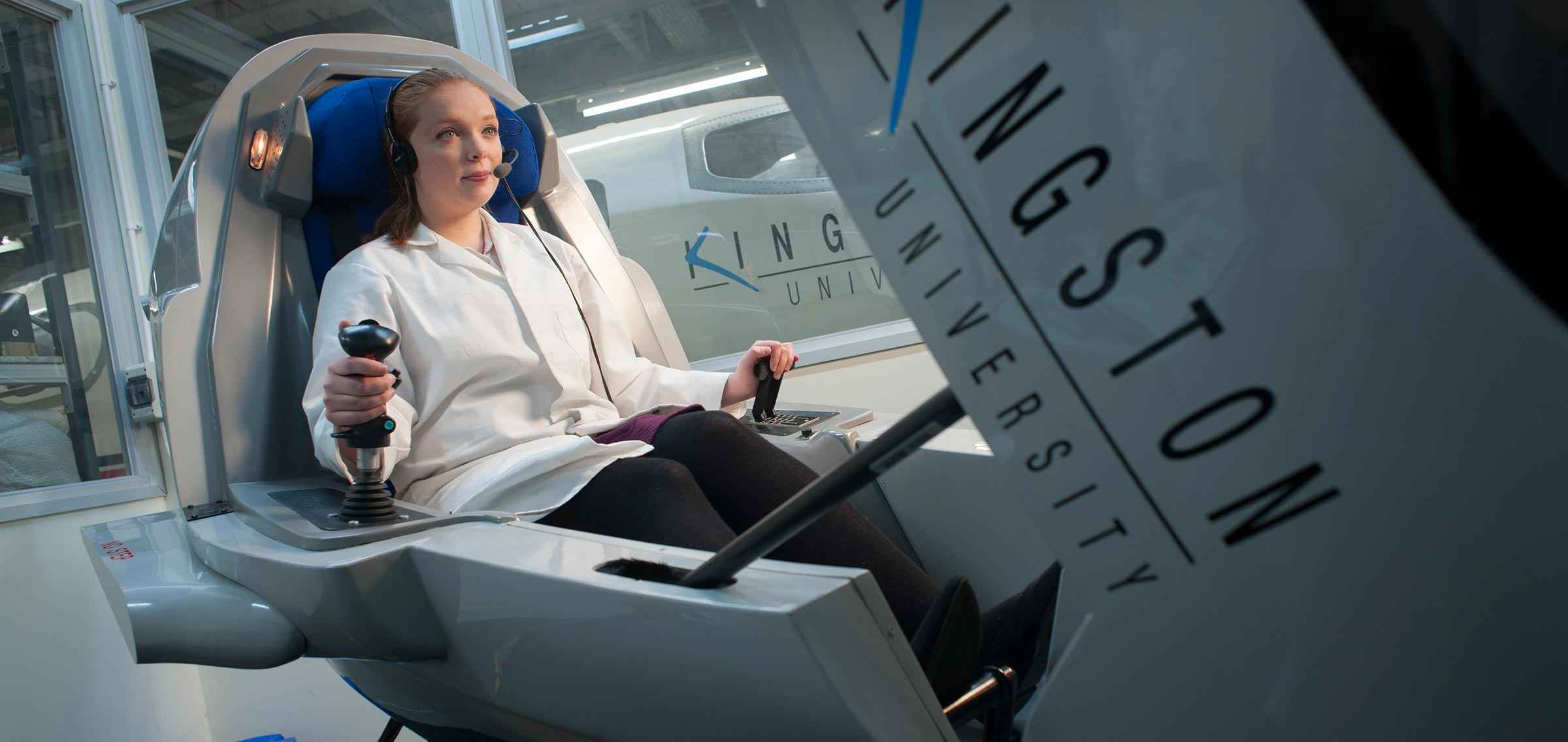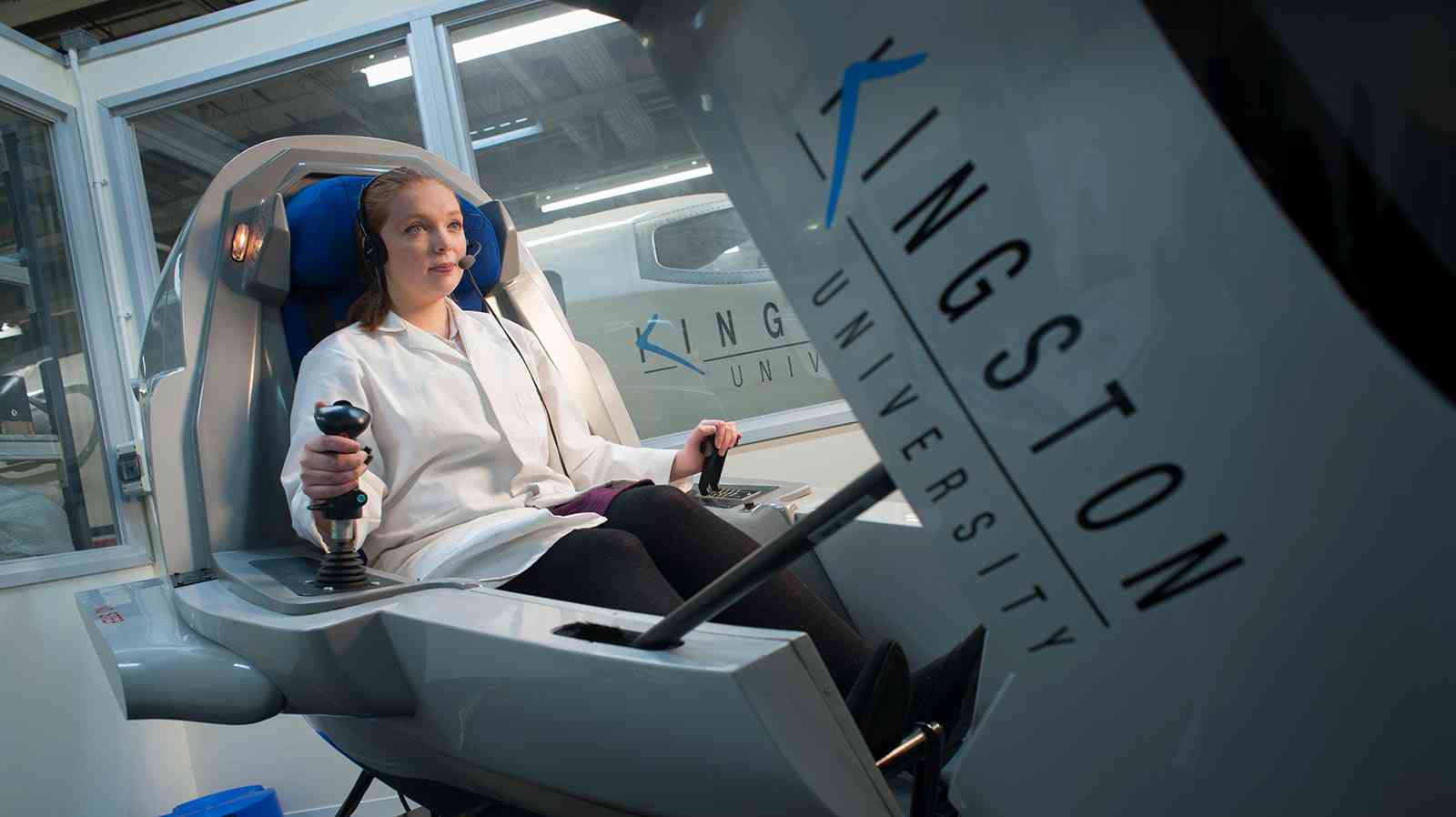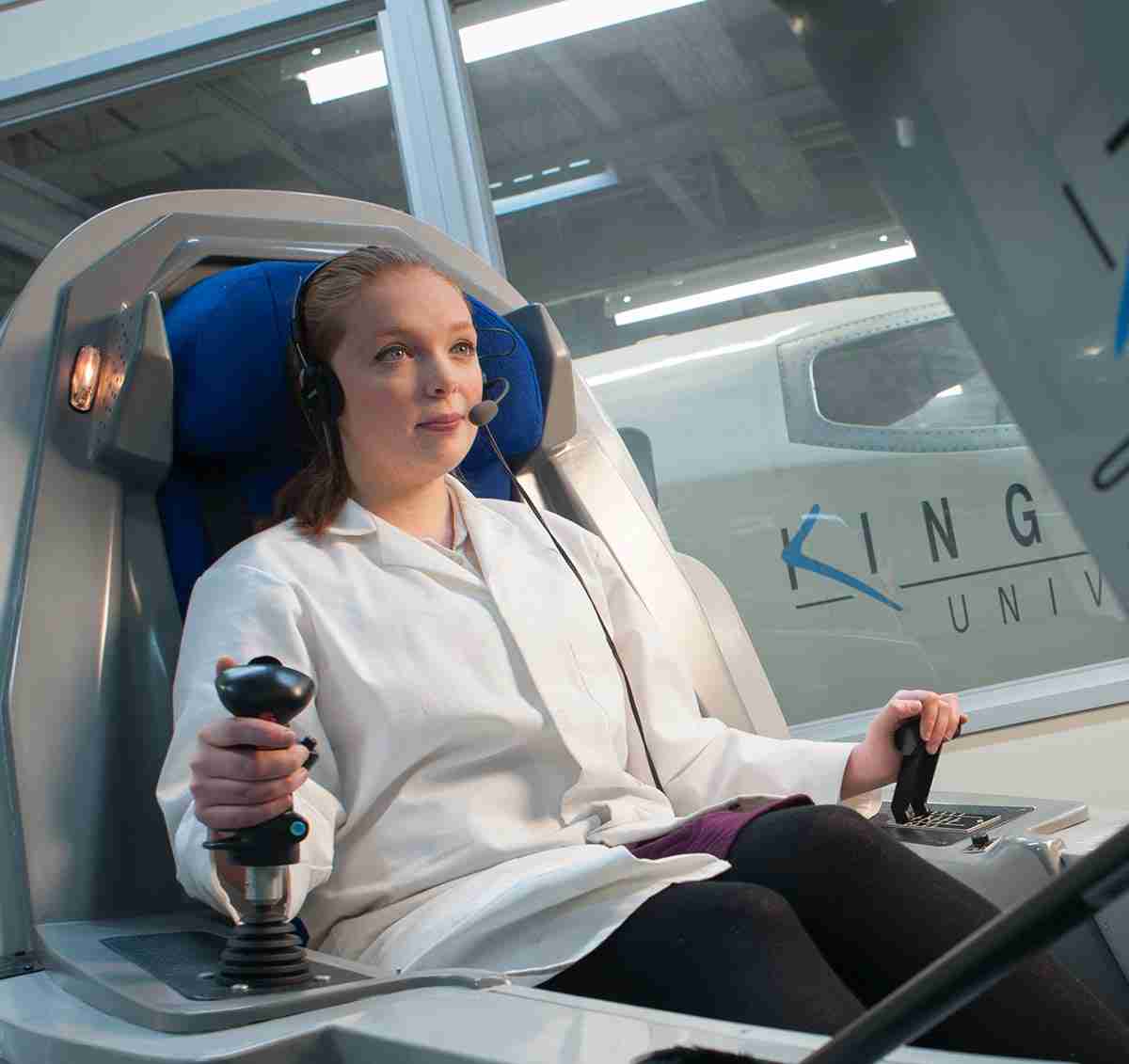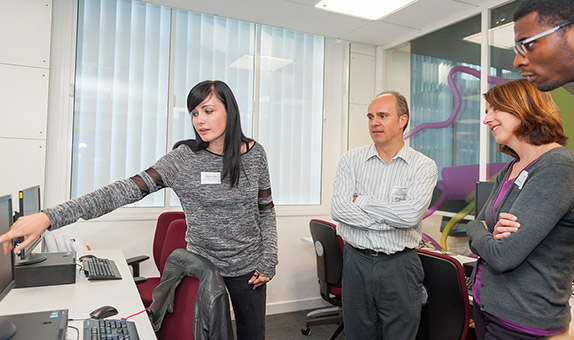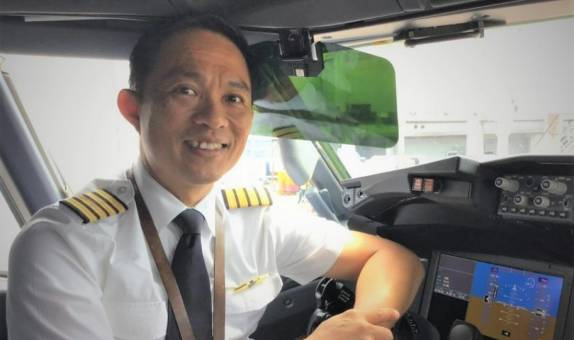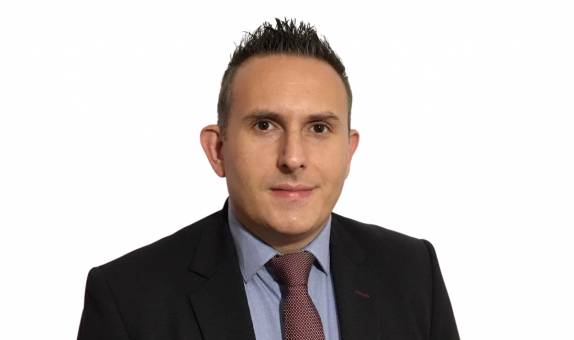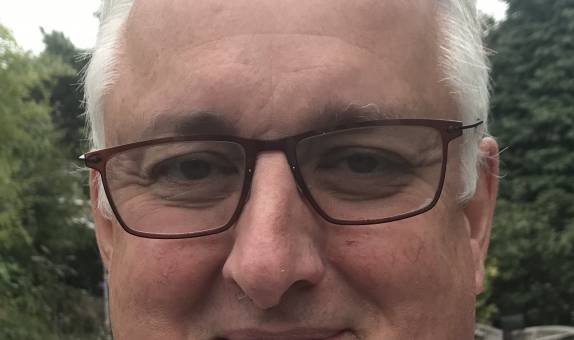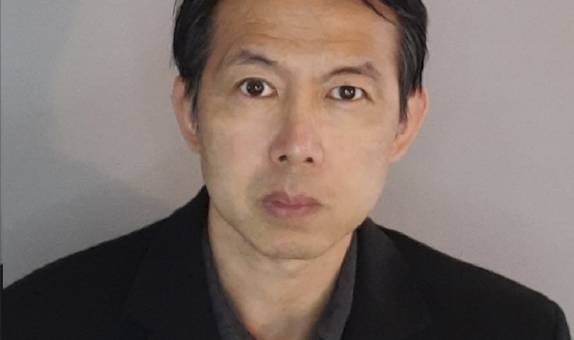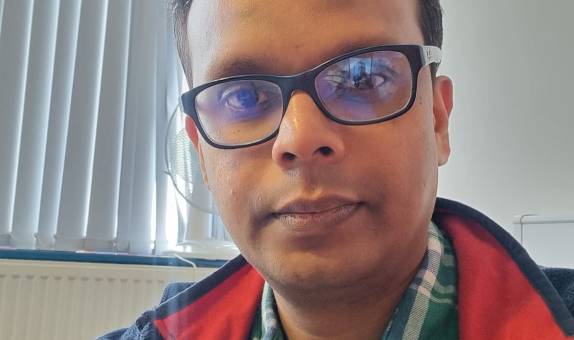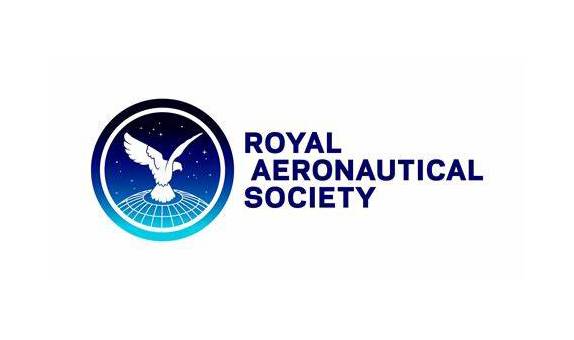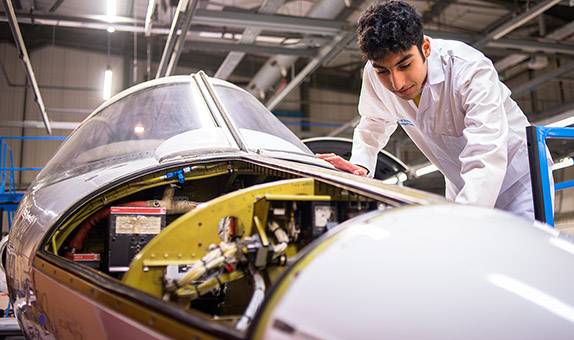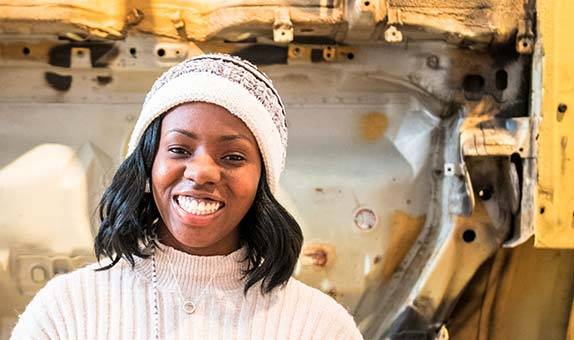Aviation Engineering BEng (Hons)

Teaching Excellence Framework (TEF) Gold award
Our commitment to high quality teaching has been recognised with a TEF Gold rating. The University has received an overall rating of Gold, as well as securing a Gold award in the framework's two new student experience and student outcomes categories.
Why choose this course?
This is an ideal degree for anyone considering an engineering career in aviation. It will prepare you to work in aircraft maintenance, airworthiness, aviation management, logistics, systems integration, design, support, manufacturing, and air transport economics.
Studies include aerodynamics, propulsion, structures and materials, analysis of structures using FEA & CAD, science and the performance of aircraft. Through practical work in laboratories and workshops, you will apply the engineering principles you learn.
This degree will also develop career skills such as effective communication, presenting, team-working, planning and project management.
If you are studying in Sri Lanka please go to our international partner institutions page.
| Attendance | UCAS code | Year of entry |
|---|---|---|
| 3 years full time | H450 | 2025 |
| 4 years full time with professional placement | H451 | 2025 |
Please note: Teaching on this course may take place on more than one KU campus.
| Main Location | Roehampton Vale |
Reasons to choose Kingston University
- This course aligns with the UK Standard for Professional Engineering Competence (UK-SPEC) and meets the academic requirements for Incorporated Engineering (IEng) Membership of the Royal Aeronautical Society (RAeS).
- You will be able to enhance your learning through an industrial placement with an approved employer.
- We have a successful history of providing graduates to the aviation industry, especially around Heathrow and Gatwick airports.
What you will study
Year 1
Year 2
Year 3
In Year 1, you will acquire the fundamental engineering knowledge and skills building a solid foundation for students to undertake a deeper study in Year 2. You will have the opportunity to carry out hands-on practical work in laboratories and workshops throughout the programme. Most modules are designed to develop key employability skills such as communication, presentation, team-working, planning and project management.
In Year 1, there is a clear structure and guidance for your learning, with an emphasis on the acquisition of fundamental engineering knowledge and skills (e.g. Mathematics and IT), practical skills, design skills and the initial development of Future Skills.
Core modules
Navigate for the Professional Engineer
15 credits
Students are introduced to their course learning aims and consider their anticipated learning targets from induction to graduation. Students are guided to identify and take ownership of their personal academic journey through the development and application of academic skills aligned to KU Graduate Attributes and their discipline-specific professional body learning outcomes.
Students are tutored in a range of learning to learn techniques, are introduced to assessment for learning and the role of feedback, reflection and feedforward as an integrated part of their learning journey. This will be supported through active engagement in the KU Navigate Programme enabling students to understand and begin to develop a design thinking approach to Future Skills development.
Engineering Mathematics
15 credits
The aim of this module is to provide a thorough background in engineering mathematics and equip students with the mathematical skills essential for solving engineering problems. The topics introduced will serve as basic tools for studies in many engineering subjects. This comprises algebra, functions, statistics and probability, trigonometry, calculus, differential equations and vectors.
Students will be empowered to understand and be able to use the language and methods of mathematics in the description, analysis and design of engineering systems. The emphasis is on using mathematical tools to solve engineering problems. The computing software used will typically include MATLAB and Excel.
Thermodynamics and Fluid Mechanics
15 credits
This module introduces mechanical engineering students to the fundamentals of fluid mechanics and thermodynamics. The fluid mechanics section covers the fundamental properties of fluids along with the main basic conservation equations and their engineering applications. It also introduces the concept of dimensions and the SI units of measurement.
Thermodynamics section deals with the relationship between heat and other forms of energy. A variety of topics of engineering and science are dependent on various thermodynamics concepts. You can find applications of thermodynamics everywhere, such as in internal combustion engine or sitting in a room with the air conditioning. The thermodynamics laws that govern the behaviour of various systems will be discussed in depth as they find applications in a variety of disciplines.
The module is primarily delivered through lectures supported by tutorial sessions and laboratory-based practical sessions.
Introduction to the Aviation Industry
15 credits
This module introduces the students to the basic knowledge of the aviation industry and the options for various career opportunities. The module is mainly delivered through face-to-face lectures and some tutorials. The module also introduces students to the challenges the industry may face in the future.
Engineering Design and Manufacture
30 credits
The principal aim of this module is to provide students with a flavour of what is involved in engineering design and to develop the good academic and professional practice needed to succeed during the course and attain professional status.
The module introduces the key aspects involved in planning a project from start to finish, design processes incorporating a sustainability agenda, building an awareness of the interactions across various disciplines, regulatory frameworks and Health and Safety procedures.
The module develops good academic and professional practice by developing skills in self-reflection and recording professional development.
The basic principles of measurement and manufacturing processes in a workshop and testing environment are also addressed in the module.
The module also involves the IMechE Design Challenge as a part of the curriculum, to provide the students with a flavour of how to work in teams to produce engineering artefacts that are capable of accomplishing tasks, as well as developing interpersonal skills in order to enhance the student's employability.
Engineering Mechanics and Materials
30 credits
The module introduces students to the fundamentals of structural analysis (statics and dynamics) and the mechanical behaviour of a broad range of engineering materials. The mechanics part provides an understanding of the behaviour of particles and rigid bodies whilst stationary and in motion. Bodies such as trusses in equilibrium are studied and the external and internal parameters including force, moment, stress, or strain are defined and calculated.
The analysis of structural components will be developed with theoretical and numerical skills that are necessary in the design of real structures. This section also introduces the dynamics of particles and rigid bodies with their engineering applications. Material test methods will be used to determine the deformations and failures of the various engineering materials.
A selection of materials for engineering applications, such as metals, alloys, polymers, and composites, will be studied including their carbon footprint and their impact on the environment. The module is primarily delivered through lectures supported by tutorial sessions and laboratory-based practical sessions.
In Year 2, there will be an increased expectation of independent study, supported by a reduced emphasis on the use of traditional lectures. You will study the engineering principles underpinning aircraft technologies such as aerodynamics, propulsion, structures and materials science and performance of aircraft. You will study aircraft maintenance operations, aircraft systems, airworthiness, and air transport economics. You will also learn to design and make aircraft structures using computational skills such as CAD and FEA. You will have problems based learning and interdisciplinary group work to tackle a live, real-world problem supplied by a well-known company or organisation.
Core modules
Exploring Engineering Project Management
15 credits
This module considers the principles and practices for the design and management of engineering projects. The nature of engineering project management is discussed in the context of constraints on quality, time, risk, and sustainability. The module broadens the student's knowledge of how organisations undertake and monitor projects.
The module is skills-rich, including the development of teamworking, interpersonal and interdisciplinary skills, critical self-reflection, communication and presentation, time management, and the ability to organise, strategize and prioritise.
A key element of this module will be the participation in an inter-disciplinary design thinking project. Students will contextualise their subject-specific knowledge, skills and behaviours as an interdisciplinary team member charged with developing a solution to a designated sustainability challenge. The teamwork project enables students to demonstrate their ability to explore and contextualise their subject specific knowledge and helps prepare them for their individual project in Level 6.
Aviation Safety
15 credits
The module aims to familiarise students with the knowledge of basic theories and methodologies for safety analysis and risk assessment in different aviation environments and with the concept and practicality of a ‘Safety Management System'. It also used to reinforce the applied statistics that has been taught earlier in the module.
Aircraft Dynamics and Control
15 credits
Aviation Operations
15 credits
The purpose of this module is to introduce students to the applied mathematical techniques that enable operational organisations to achieve efficiency and productivity. The focus of the teaching is on airline operations, but the techniques taught are equally applicable to other transport industries which share similar operational challenges. It is also used to reinforce the applied statistics that have been taught earlier in the module.
Aerospace Engineering
30 credits
Aircraft Systems
30 credits
In Year 3, you will study advanced materials and structures, propulsion and performance, aircraft maintenance, airworthiness and air transport economics. The assessment tasks in Year 3 focus on the real world-engineering activities that enhance students' employability. In Year 3, you will also learn about maintenance logistics, maintenance cost drivers and the key aspects of project planning. You will apply business methods to assess the economic and financial aspects of air transport and/or engineering projects. In this final year, you will be expected to select and apply requisite practical skills in your own independent research work in the Individual Project module.
Core modules
Applying Business Management
15 credits
Students will demonstrate the ability to apply their developing professional skills competencies in their chosen area and will ensure they have a broad understanding of the business environment in which professional activities are undertaken. The module will develop the students' technical, management and interpersonal skills required to perform in a team environment and prepare the students for employment and entrepreneurship.
Students will participate in Kingston University's Bright Ideas competition where they will work together as a team to develop a business idea of their choice. To do this they will need to interact with relevant stakeholders outside the University.
Students will be guided to interact with professional and learning communities beyond the university and reflect on these interactions. This may include participation in co-curricular events such as subject-specific and career development events (e.g. talks, workshops, speed interviews), networking opportunities offered by the subject-specific professional bodies, exploring pathways to professional chartership/membership, leveraging interactions with professionals in the development of the final year research project and, reflecting on the co-benefits of these interactions.
Aircraft Propulsion and Performance
15 credits
This module is designed for students from a range of aerospace related programmes. It provides understanding of the principles of aerodynamics and thermodynamics and how these can be used to perform propulsion calculation and performance analysis. Performance of both fixed wing and rotary wing aircraft configurations are studies in this module.
Advanced Materials and Aircraft Structures
15 credits
This module provides an understanding of the fundamentals and the application of advanced engineering materials for aerospace applications. This module also covers an introduction to aircraft structures and engineering beam theory. The module covers approach to design components based on materials properties are demonstrated and areas of the design process are methodically examined. The module is primarily delivered through interactive lectures, tutorials, and problem-solving, flipped classes.
Aircraft Maintenance Group Project
30 credits
Air Transport Economics
15 credits
Throughout their studies, students have studied material that has been focused on a specific role or roles within the air transport industry whether it be aircraft design, maintenance, operations or repair and overhaul. The aim of this module is to take a step back and explore how employers within the various sectors of the air transport industry combine all these functions in order to make a profit.
Individual Project
30 credits
Working on a topic of their own choosing, the student, with minimal guidance from their supervisor, should apply approximately 285 hours of individual time into the analysis of the problem and determination of the best solution or course of action. That analysis can take a variety of forms ranging from an in-depth comparison of a number of already documented potential solutions to the collection and comparison of experimental and theoretical data. The topic investigated should ideally be of an aircraft operational or engineering nature.
Department of Aerospace and Aircraft Engineering
Future Skills
Knowledge to give you the edge
Embedded within every course curriculum and throughout the whole Kingston experience, Future Skills will play a role in shaping you to become a future-proof graduate, providing you with the skills most valued by employers such as problem-solving, digital competency, and adaptability.
As you progress through your degree, you'll learn to navigate, explore and apply these graduate skills, learning to demonstrate and articulate to employers how future skills give you the edge.
At Kingston University, we're not just keeping up with change, we're creating it.

Entry requirements
Teaching and assessment
Scheduled learning and teaching on this course includes timetabled activities including lectures, seminars and small group tutorials.
It may also include placements, project work, workshops, workshops in computer labs, and laboratory workshops.
Who teaches this course?
The course is taught by the Department of Aerospace and Aircraft Engineering. Staff have a wide range of experience across research and industry and continue to practise and research at the cutting edge of their discipline. This ensures that our courses are current and industry informed, ensuring you get the most relevant and up-to-date education possible.
We have a dedicated campus for engineering students at Roehampton Vale, a short journey from Kingston town centre and close to Richmond Park.
We offer a wide range of specialist facilities on site, supported with software technology and laboratory technicians.
Renowned companies are involved in course delivery, placements, final year projects and industry talks. These companies range from global leaders KLM Engineering, Marshall Aerospace and the Defence Group, Airbus UK, Astrium Eads, GE Aircraft, and Lockheed, to small and medium enterprises such as Aero Optimal, Aircraft Research Associates, and Aim Aviation.
Postgraduate students may run, or assist in, lab sessions and may also contribute to the teaching of seminars under the supervision of the module leader.
Facilities
There is a wide range of facilities for practical work at our Penrhyn Road campus, where this course is based. You will have access to a modern environment with the latest technology and industry-standard equipment, including:
- extensive materials and structures facility for concrete, masonry, steel and timber;
- geotechnical and hydraulics testing facilities; and
- surveying equipment, such as satellite global-positioning systems.
Dedicated computer-aided design facilities include:
- a range of CAD/CAM packages, such as Ideas, SolidWorks and AutoCad;
- finite element analysis
- computational fluid dynamics; and
- virtual instrumentation.
Course fees and funding
Additional costs
Depending on the programme of study, there may be extra costs that are not covered by tuition fees which students will need to consider when planning their studies. Tuition fees cover the cost of your teaching, assessment and operating University facilities such as the library, access to shared IT equipment and other support services. Accommodation and living costs are not included in our fees.
Where a course has additional expenses, we make every effort to highlight them. These may include optional field trips, materials (e.g. art, design, engineering), security checks such as DBS, uniforms, specialist clothing or professional memberships.
After you graduate
Careers and progression
Career opportunities include maintenance and licensed aircraft engineering, certification, quality assurance, logistics, planning, design, technical services, production and control engineering. Employers are often the military, civil aviation and aerospace companies.
Accreditation
The proposed course can satisfy the requirements of the Royal Aeronautical Society and UK-Spec of the Engineering Council. Incorporated Engineer (IEng) accreditation for the programme will be sought from the Royal Aeronautical Society in the spring of 2019. Students who have enrolled in the course before the accreditation will be fully recognised by the PSRB.
What our students say
Key information set
The scrolling banner(s) below display some key factual data about this course (including different course combinations or delivery modes of this course where relevant).
Course changes and regulations
The information on this page reflects the currently intended course structure and module details. To improve your student experience and the quality of your degree, we may review and change the material information of this course. Course changes explained.
Programme Specifications for the course are published ahead of each academic year.
Regulations governing this course can be found on our website.
